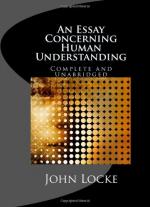
|
| Name: _________________________ | Period: ___________________ |
This test consists of 5 short answer questions, 10 short essay questions, and 1 (of 3) essay topics.
Short Answer Questions
1. What does Locke argue against in Chapter 2 of Book I?
2. Where do primary qualities originate, according to Locke?
3. What is the contemporary name for Locke's field of inquiry?
4. How does Locke use garlic to illustrate his argument about the qualities of things?
5. What does Locke say is his purpose in "Essay Concerning Human Understanding"?
Short Essay Questions
1. What is the difference between natural principles and innate principles?
2. How does Locke use the concept of number in his discussion of primary qualities?
3. What does Locke say happens if two people have the same idea about a thing?
4. Describe the two kinds of ideas Locke describes.
5. How does Locke define practical principles?
6. What aspect of knowledge does Locke exclude from "Essay Concerning Human Understanding"?
7. What does Locke say about sensations experienced in the womb?
8. How does Locke define the faculty of perception?
9. How does Locke define retention?
10. What is the difference between sensation and reflection, in Locke's account?
Essay Topics
Write an essay for ONE of the following topics:
Essay Topic 1
Locke speculates that desire is unhappiness in the absence of previous delight--how does he handle the question of original experience, and how could his philosophy respond to the doctrine of original sin?
Essay Topic 2
How does Locke protect his philosophy against the skepticism of Hume and Descartes? What arguments specifically does he refute, and what arguments does he leave himself open to? (Do you think the question of whether innate knowledge exists can be answered?)
Essay Topic 3
What makes this book an essay? Is there a better term for it?
|
This section contains 673 words (approx. 3 pages at 300 words per page) |

|




